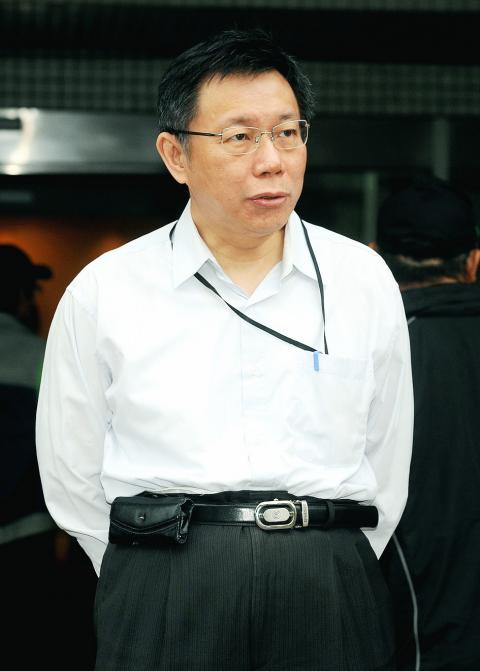The Control Yuan has decided to impeach Ko Wen-che (柯文哲), the former head of National Taiwan University Hospital’s organ transplant task force, because the hospital used HIV-infected organs in four transplants last year. The Control Yuan passed a motion submitted by members Teresa Yin (尹祚芊) and Li Ful-dien (李復甸) to impeach Ko for dereliction of duty by an 8-2 vote, but it remains unclear if the move will have any tangible effect on Ko’s job.
“It doesn’t matter,” Ko said in response to the Control Yuan’s ruling.
The hospital accidentally transplanted HIV-positive organs from a Hsinchu man into four patients in August last year. A fifth organ from the man was used in an organ transplant at National Cheng Kung University Hospital in Tainan.

Photo: Lin Cheng-kung, Taipei Times
As a doctor at a public hospital, Ko is subject to oversight by the Control Yuan, the government branch responsible for investigating and censuring irregular or illicit behavior by public servants and government agencies. The report said Ko neglected his duties by entrusting staff and organ donation coordinators who were not doctors with the responsibility of writing physician orders and interpreting examination reports, which violated the Physicians Act ( 醫師法). Ko neglected to review the organ donation examination results and did not follow the hospital’s normal specimen test regulations, the report added.
The Control Yuan also held Ko responsible for neglecting the training, supervision and evaluation of organ donation coordinators and for authorizing less-experienced coordinators to help with preparations before the transplant operations.
The physician’s negligence not only seriously damaged the health of organ recipients and medical staff engaged in the operations, it also greatly damaged the hospital’s reputation and Taiwan’s image, the report said.
Hospital spokesman Tan Ching-ting (譚慶鼎) said the hospital would respond after it had received and reviewed the report.

Taiwan is stepping up plans to create self-sufficient supply chains for combat drones and increase foreign orders from the US to counter China’s numerical superiority, a defense official said on Saturday. Commenting on condition of anonymity, the official said the nation’s armed forces are in agreement with US Admiral Samuel Paparo’s assessment that Taiwan’s military must be prepared to turn the nation’s waters into a “hellscape” for the Chinese People’s Liberation Army (PLA). Paparo, the commander of the US Indo-Pacific Command, reiterated the concept during a Congressional hearing in Washington on Wednesday. He first coined the term in a security conference last

Prosecutors today declined to say who was questioned regarding alleged forgery on petitions to recall Democratic Progressive Party (DPP) legislators, after Chinese-language media earlier reported that members of the Chinese Nationalist Party (KMT) Youth League were brought in for questioning. The Ministry of Justice Investigation Bureau confirmed that two people had been questioned, but did not disclose any further information about the ongoing investigation. KMT Youth League members Lee Hsiao-liang (李孝亮) and Liu Szu-yin (劉思吟) — who are leading the effort to recall DPP caucus chief executive Rosalia Wu (吳思瑤) and Legislator Wu Pei-yi (吳沛憶) — both posted on Facebook saying: “I

The Ministry of Economic Affairs has fined Taobao NT$1.2 million (US$36,912) for advertisements that exceed its approved business scope, requiring the Chinese e-commerce platform to make corrections in the first half of this year or its license may be revoked. Lawmakers have called for stricter enforcement of Chinese e-commerce platforms and measures to prevent China from laundering its goods through Taiwan in response to US President Donald Trump’s heavy tariffs on China. The Legislative Yuan’s Finance Committee met today to discuss policies to prevent China from dumping goods in Taiwan, inviting government agencies to report. Democratic Progressive Party Legislator Kuo Kuo-wen (郭國文) said

Sung Chien-liang (宋建樑), who led efforts to recall Democratic Progressive Party (DPP) Legislator Lee Kun-cheng (李坤城), was released on bail of NT$80,000 today amid outcry over his decision to wear a Nazi armband to questioning the night before. Sung arrived at the New Taipei District Prosecutors’ Office for questioning in a recall petition forgery case last night wearing a red armband bearing a swastika, carrying a copy of Adolf Hitler’s Mein Kampf and giving a Nazi salute. Sung left the building at 1:15am without the armband and covering the book with his coat. Lee said today that this is a serious